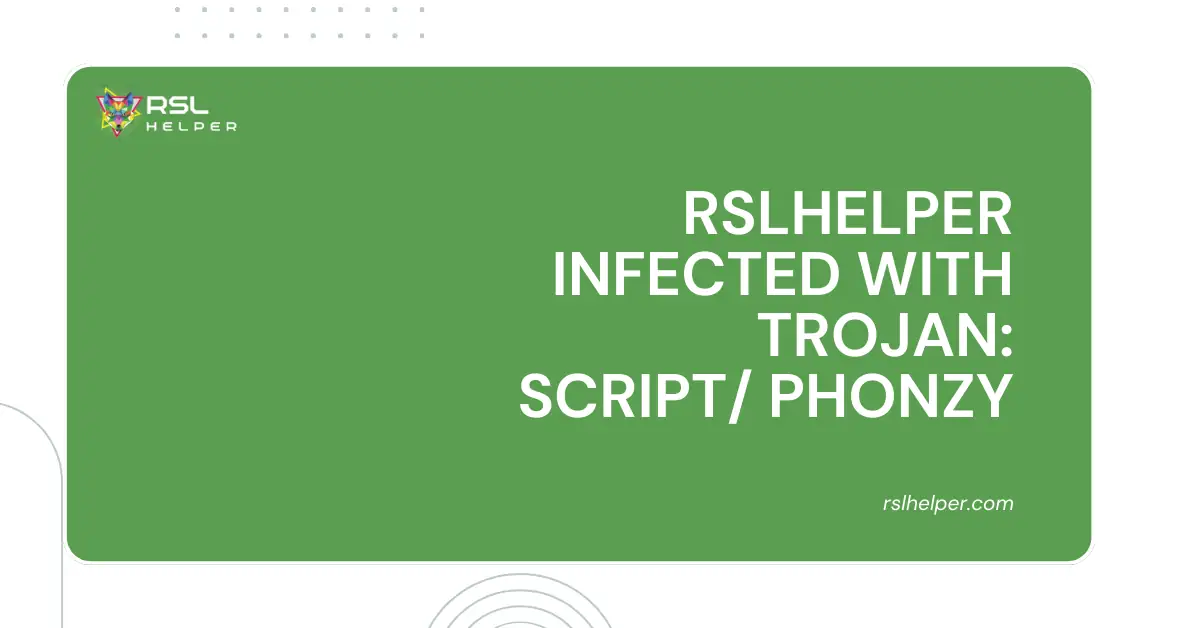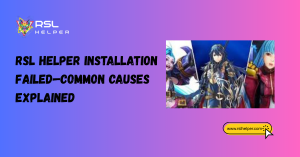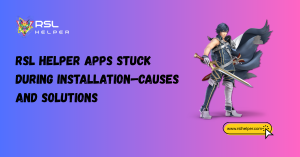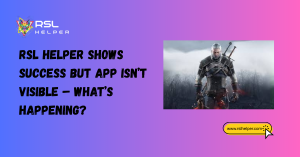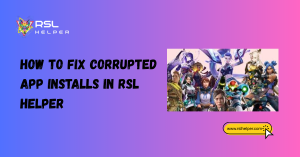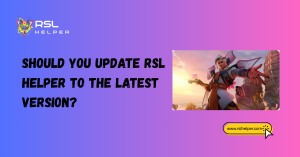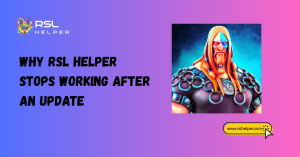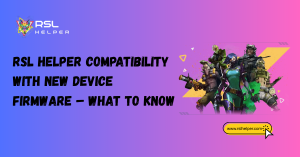Your RSLHelper Trojan program might be infected with a Trojan called Trojan:Script/Phonzy. Trojans are malicious programs that disguise themselves as legitimate software to gain access to your system.
In this case, Infected with Trojan: Script/Phonzy could be stealing your data, installing other malware, or taking control of your device. Let’s explore what you can do to remove this infection and protect your computer.

Table of Contents
ToggleRSLHelper: Friend or Foe?
RSLHelper is a third-party program designed to assist players of the mobile game Raid: Shadow Legends. It automates repetitive tasks within the game, such as running dungeons, managing gear, and training champions.
While it can be a time-saver for avid players, there are some key things to consider about RSLHelper:
- Third-Party Tool: Since it’s not an official program from the game developers (Plarium), its safety and functionality rely on the creator’s ongoing maintenance.
- Potential Benefits: If used correctly, RSLHelper can streamline gameplay by automating tedious tasks, allowing players to focus on strategy and team building.
- Security Concerns: There have been instances where unofficial programs like RSLHelper Trojan have been flagged by antivirus software as harboring malware. In this specific case, some reports indicate a potential infection with Trojan:Script/Phonzy. Trojans disguise themselves as legitimate software to gain access to your system and steal data, install other malware, or take control of your device.
So, is RSLHelper safe?
Here’s what to consider before using it:
- Download Source: Only download RSLHelper from trusted sources, like the developer’s GitHub repository. Avoid downloading from unofficial websites or links, as they might contain modified versions with malicious code.
- Antivirus Check: Before running RSLHelper Trojan, scan it with your antivirus software to ensure it’s clean.
- User Reviews: Read reviews from other players to understand the program’s functionality and potential risks.
- Alternative Options: Explore in-game features that might offer similar automation options without relying on third-party tools.
Infected with Trojan: Script/Phonzy – A Stealthy Intruder
Trojan:Script/Phonzy is a malicious program categorized as a Trojan horse. Trojans disguise themselves as legitimate software to trick users into installing them. Once on your system, they operate in the background, unseen, while carrying out their devious tasks.
Here’s a deeper look into what makes Trojan:Script/Phonzy a sneaky threat:
- Delivery Method: You might have unknowingly downloaded Trojan:Script/Phonzy through:
- Bundled Software: Free software downloads or pirated programs sometimes come bundled with malware like Trojans.
- Phishing Attacks: Deceptive emails with malicious attachments or links can install Trojans when clicked.
- Drive-by Downloads: Visiting compromised websites can unknowingly download Trojans onto your device.
- Script-Based: The “Script” in its name suggests it relies on scripts, which are sets of instructions, to perform its malicious actions. This scripting allows for flexibility and potential updates by the attackers.
- Information Theft: Trojan:Script/Phonzy might be designed to steal sensitive information like login credentials, banking details, or personal data.
- Remote Control: In some cases, Trojans like Script/Phonzy can grant remote access to your device, allowing attackers to control it, install additional malware, or spy on your activities.
How did you find out about it?
The good news is, your antivirus software likely detected Trojan:Script/Phonzy. Most antivirus programs actively scan your system and flag suspicious programs. This detection provides an opportunity to remove the threat before it can wreak havoc.
The “Phonzy” Connection
While the specific details of Script/Phonzy’s functionalities might vary, the name “Phonzy” might hint at its potential focus on mobile devices. Trojans targeting phones could be designed to steal contact information, SMS messages, or even control phone functions.
What to do next?
Here are some crucial steps to take:
- Remove the Threat: Follow your antivirus software’s instructions to quarantine or remove Trojan:Script/Phonzy.
- Change Passwords: If you suspect information theft, immediately change passwords for any accounts you might have used on the infected device.
- Scan for More Malware: Run a full system scan with your antivirus to identify and eliminate any other potential threats.
- Stay Vigilant: Be cautious about downloading software from untrusted sources and remain wary of suspicious emails or website links.
Taking Back Control: Responding to the RSLHelper Trojan:Script/Phonzy Threat
Being alerted to a potential Trojan infection can be unnerving, but don’t panic. Here’s a detailed roadmap to investigate, remove the threats, and secure your system:
Investigate RSLHelper:
- Online Search: Conduct a web search for “RSLHelper Trojan” or “RSLHelper malware” using a reputable search engine. Look for reliable sources like antivirus company websites, security blogs, or forums frequented by tech experts. This will help you gather insights into the legitimacy of RSLHelper Trojan and its potential association with Trojan: Script/Phonzy.
- Antivirus Scan: Right-click on the RSLHelper Trojan file (if you can locate it) and select the option to scan it with your antivirus software. This scan will check the program against a database of known malware threats and provide a verdict on its safety.
Decision Time – Remove RSLHelper (if malicious):
- Antivirus Guidance: If your investigation or antivirus scan confirms that the RSLHelper Trojan is indeed malicious, follow the specific removal instructions provided by your antivirus software. These instructions might involve quarantining the program, deleting it entirely, or using a specialized removal tool offered by your antivirus provider.
- Manual Removal (not recommended unless confident): Some antivirus programs might offer the option to manually quarantine or remove the program for advanced users. However, this process is typically not recommended for non-experts, as it can be risky if done incorrectly. It’s best to rely on the expertise of your antivirus software’s automated removal tools.
Comprehensive System Scan:
- Go Beyond RSLHelper: Since Trojan: Script/Phonzy might have entered your system through other means, it is crucial to perform an entire system scan using your antivirus software. This comprehensive scan will check your device for other malware hiding in the background.
- Consider a Second Opinion: If you’re unsure about the effectiveness of your primary antivirus, you can download and run a free scan with a reputable secondary antivirus program to get a broader perspective.
Conclusion
In conclusion, RSLHelper Trojan: Script/Phonzy is a severe threat that can compromise your device’s security and steal sensitive information. While antivirus software can help detect it, vigilance is key. Be cautious about what you download, stay informed about malware threats, and keep your antivirus software up-to-date.
If you encounter RSLHelper Trojan: Script/Phonzy, prioritize its removal and take steps to secure your accounts. Remember, a little caution goes a long way in protecting your data and privacy in the digital world.
FAQs
What is RSLHelper Trojan: Script/Phonzy?
A: RSLHelper Trojan: Script/Phonzy is a type of malicious software (malware) designed to infiltrate computer systems and steal sensitive information. It can disguise itself as legitimate software or scripts while performing unauthorized actions, such as data theft or system damage.
How did RSLHelper become infected with Trojan: Script/Phonzy?
A: RSLHelper may have become infected with Trojan: Script/Phonzy through various means, including downloading infected CSV files or visiting compromised websites. Cybercriminals often distribute malware through deceptive tactics such as phishing emails, fake software downloads, or compromised websites.
What are the potential risks of having Trojan:Script/Phonzy on my system through RSLHelper?
A: Having RSLHelper Trojan: Script/Phonzy on your system through RSLHelper can pose significant risks, including unauthorized access to your personal or financial information, system instability or crashes, and potential exploitation of security vulnerabilities.
How can I remove RSLHelper Trojan: Script/Phonzy from my system?
A: Removing Trojan:Script/Phonzy from RSLHelper and your system requires thorough malware detection and removal procedures. You can use reputable antivirus or antimalware software to scan and remove the infection. Additionally, follow the recommended steps provided by your antivirus software to ensure complete removal.
Should I continue using RSLHelper after removing Trojan:Script/Phonzy?
A: After removing Trojan:Script/Phonzy from RSLHelper and your system, it’s essential to ensure that RSLHelper is free from any remaining malware or vulnerabilities. Consider reinstalling RSLHelper from a trusted source or using alternative tools to avoid potential re-infection.
Latest Posts
- RSL Helper Stuck on Loading Screen: Fix with Cache Reset & Config Check
- RSL Helper Installation Failed—Common Causes Explained
- RSL Helper Apps Stuck During Installation—Causes and Solutions
- RSL Helper Shows Success but App Isn’t Visible – What’s Happening?
- RSL Helper Corrupted App Installations—How to Resolve

